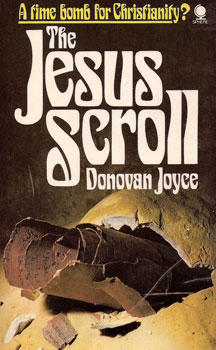Unsolved:The Jesus Scroll
The Jesus Scroll is a best-selling book[1] first published in 1972 and written by Australian author Donovan Joyce. A forerunner to some of the ideas later investigated in The Da Vinci Code,[2][3] Joyce's book made the claim that Jesus of Nazareth may have actually died aged 80 at Masada[4] near the Dead Sea, site of the last stand made by Jewish zealot rebels against the Roman Empire, after the Fall of Jerusalem and the destruction of the Second Temple.
Joyce, an Australian journalist, claimed to have seen a scroll stolen from the Masada excavations. He wrote that it was one of fifteen scrolls discovered during the dig there. His book states that the stolen autobiographical scroll was signed Yeshua ben Ya’akob ben Gennesareth, who described himself as eighty years old and added that he was the last of the rightful kings of Israel. The name when translated into English became Jesus of Gennesareth, son of Jacob.[5] Joyce identifies the author as Jesus of Nazareth. Joyce's book further suggests that Jesus may have survived the crucifixion, was present during the Roman siege of Masada during the Jewish Revolt of 66-74 AD, and that he had married Mary Magdalene and fathered a child with her.
Joyce claimed that he attempted to visit Masada in 1964 during the archaeological excavation but was prevented by Yigael Yadin. Joyce further claimed that an anonymous and corrupt archaeologist, "Dr. Grosset", asked him to help smuggle the 'Jesus Scroll' out of Israel that had been discovered during that dig.[6] Joyce says in his book that the scroll was sneaked aboard an airplane by Dr. Grosset, who then most likely took it to Russia to strike a deal with Soviet leaders.[6]
Joyce proposed controversial theories concerning the historicity of Jesus that caused outrage among many Christians, and for which he received numerous death threats.[1]
References
- ↑ 1.0 1.1 "Joyce, Donovon Maxwell (1910-1980)". Australian Dictionary of Biography. Canberra: Australian National University. http://www.adb.online.anu.edu.au/biogs/A140674b.htm. Retrieved 2008-03-26.
- ↑ "The Essential Guide to The Da Vinci Code". http://www.abc.net.au/rn/relig/spirit/stories/s1353832.htm. Retrieved 2008-03-26.From interview on Sunday 1 May 2005: Rachael Kohn: "Now it’s pretty unusual to call together scholars of Early Christianity to discuss a popular novel. When do you think this would have been done before? With Hugh Schonfield’s The Passover Plot? That caused quite a stir. Chris Forbes: "Or Donovan Joyce brought out The Jesus Scroll, or Baigent and Leigh's, Holy Blood, Holy Grail, The Messianic Legacy and the other three or four volumes that followed perhaps."
- ↑ Maier, Paul L. In The Da Vinci Deception, Tyndale Books, 2004. ISBN:1-4143-0279-7. p.3. Accessed March 28, 2008. "In claims similar to those in the Qur'an, Donovan Joyce's The Jesus Scroll unveiled 'Jesus the Senescent Savior', who survived Golgotha and lived to the ripe old age of eighty."
- ↑ "The Good Book-and Others-in '73". Time. 1973-12-24. http://www.time.com/time/magazine/article/0,9171,943514,00.html. Retrieved 2008-03-26. "Smith's cheek [in The Secret Gospel] seems modest, however, compared to the sheer gall of Australian Donovan Joyce, creator of a preposterous pseudo-study called The Jesus Scroll (Dial Press; $5.95). In Donovan's account Jesus does not expire on the cross but marries Mary Magdalene and dies at 80, "the last Hasmonean king of Israel," defended by loyal Zealots at Masada."
- ↑ The “real” Jesus Stories
- ↑ 6.0 6.1 Joyce, Donovan (1975). The Jesus Scroll
 |


